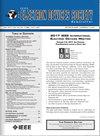基于机器学习的 40 纳米 CMOS 晶体管热载流子注入建模
IF 2
3区 工程技术
Q3 ENGINEERING, ELECTRICAL & ELECTRONIC
引用次数: 0
摘要
本文介绍了一种基于机器学习的方法,用于对金属氧化物半导体场效应晶体管(MOSFET)中的热载流子注入进行降解建模。采用了具有不同沟道几何形状的 n 型和 p 型 MOSFET 在各种应力条件下的应力测量数据。采用高斯过程回归算法对漏极-源极电流、阈值电压和漏极-源极电导的应力后特性进行建模。模型结果与实际测量结果进行了比较,并通过提供适当的统计指标证明了所生成模型在整个测试数据中的准确性。最后,还考虑了退化估计的案例研究,包括在具有不同沟道几何结构或处于不同应力条件下的晶体管上使用基于机器学习的模型。分析结果表明,已建立的模型在这种情况下具有很高的准确性。本文章由计算机程序翻译,如有差异,请以英文原文为准。
Machine Learning-Based Modeling of Hot Carrier Injection in 40 nm CMOS Transistors
This paper presents a machine-learning-based approach for the degradation modeling of hot carrier injection in metal-oxide-semiconductor field-effect transistors (MOSFETs). Stress measurement data have been employed at various stress conditions of both n- and p-MOSFETs with different channel geometries. Gaussian process regression algorithm is preferred to model the post-stress characteristics of the drain-source current, the threshold voltage, and the drain-source conductance. The model outcomes have been compared with the actual measurements, and the accuracy of the generated models has been demonstrated across the test data by providing the appropriate statistics metrics. Finally, case studies of degradation estimation have been considered involving the usage of machine-learning-based models on transistors with different channel geometries or subjected to distinct stress conditions. The outcomes of this analysis reveal that the established models yield high accuracy in such contexts.
求助全文
通过发布文献求助,成功后即可免费获取论文全文。
去求助
来源期刊

IEEE Journal of the Electron Devices Society
Biochemistry, Genetics and Molecular Biology-Biotechnology
CiteScore
5.20
自引率
4.30%
发文量
124
审稿时长
9 weeks
期刊介绍:
The IEEE Journal of the Electron Devices Society (J-EDS) is an open-access, fully electronic scientific journal publishing papers ranging from fundamental to applied research that are scientifically rigorous and relevant to electron devices. The J-EDS publishes original and significant contributions relating to the theory, modelling, design, performance, and reliability of electron and ion integrated circuit devices and interconnects, involving insulators, metals, organic materials, micro-plasmas, semiconductors, quantum-effect structures, vacuum devices, and emerging materials with applications in bioelectronics, biomedical electronics, computation, communications, displays, microelectromechanics, imaging, micro-actuators, nanodevices, optoelectronics, photovoltaics, power IC''s, and micro-sensors. Tutorial and review papers on these subjects are, also, published. And, occasionally special issues with a collection of papers on particular areas in more depth and breadth are, also, published. J-EDS publishes all papers that are judged to be technically valid and original.
 求助内容:
求助内容: 应助结果提醒方式:
应助结果提醒方式:


